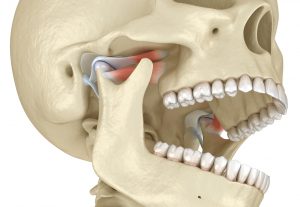 Many of the most common oral health concerns involve the health and integrity of your teeth and/or oral tissues (such as your gums). For example, the two most frequent oral health problems are tooth decay and gum disease, which involve oral bacteria eroding your tooth structure or gum tissues, respectively. However, when you experience pain or discomfort in your jaw, it can be more difficult to understand the problem on your own. For many people, discomfort in the jaw is an indication of TMJ disorder, which means one or both of their jaw’s joints have become unable to function properly.
Many of the most common oral health concerns involve the health and integrity of your teeth and/or oral tissues (such as your gums). For example, the two most frequent oral health problems are tooth decay and gum disease, which involve oral bacteria eroding your tooth structure or gum tissues, respectively. However, when you experience pain or discomfort in your jaw, it can be more difficult to understand the problem on your own. For many people, discomfort in the jaw is an indication of TMJ disorder, which means one or both of their jaw’s joints have become unable to function properly.
The normal function of healthy TMJs
TMJs, or temporomandibular joints, are the two large joints that your lower jaw (or mandible) hinges on. These joints are meant to move in tandem whenever you bite, chew, speak, or open and close your mouth, ensuring that your bite stays even and your teeth meet each other squarely each time. To function properly, both of your TMJs must move at the same time, in the same direction, and to the same degree, which relies on all of your teeth and oral structures being evenly aligned. Discrepancies in this alignment, or other issues that place your TMJs under excessive pressure, can lead to damage to one or both of the joints, and the formation of a potentially painful TMJ disorder.
Signs that you have a TMJ disorder
When one or both of your TMJs are compromised, it can negatively impact several different aspects of your oral health and bite function. One of the common immediate consequences is a change in how your bite functions, such as your joints shifting when open and close your bite, or pain radiating from the jaw joints and muscles. You might also notice one or more of the following TMJ disorder symptoms:
- Chronic headaches and migraines
- Pain and ringing in your ears (tinnitus)
- Popping or clicking jaw joints
- Uncontrollable teeth-grinding (bruxism)
- Sore muscles in the face, neck, and shoulders
- And more
Treating the disorder and relieving the pain
When you develop a TMJ disorder, the symptoms of the disorder can grow increasingly worse over time. This means pain and discomfort in your jaw and elsewhere may grow more intense, and your bite’s overall function can diminish further. The most effective way to find relief from a TMJ disorder is to have your dentist carefully diagnose the problem and any consequences it may have had on your teeth, oral tissues, or more. In some cases, TMJ disorder can be alleviated conveniently with the help of a custom-designed oral appliance, which can help relieve chronic tension on your TMJs.
Learn more about TMJ treatment
When your bite function is inhibited by TMJ disorder, the dysfunction and discomfort might be relieved with personalized TMJ treatment. To learn more, or to schedule a consultation, call Cedar Dental in Cedar Rapids, IA, today at (319) 364-7108.




Recent Comments